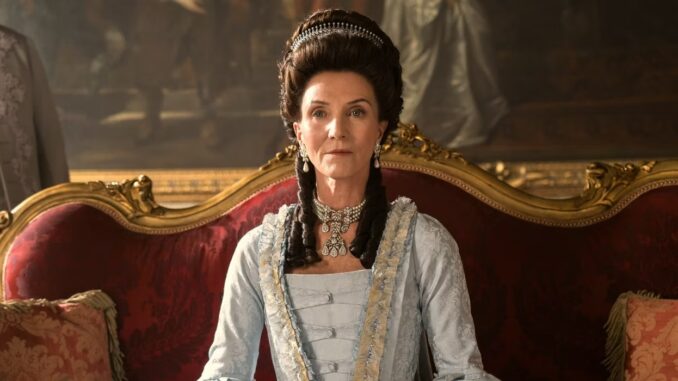
Another issue that Charlotte had to deal with during the early years of her relationship with George was the overbearing presence of her horrid mother-in-law, Princess Dowager Augusta (Michelle Fairley). The king’s mother is the closest one can get to putting a corset on hell itself. From making racist, hurtful remarks about Charlotte’s skin color to all but physically forcing her son and her daughter-in-law to produce an heir (something that the queen would later do to her own children), nothing is beneath Augusta. As a matter of fact, in the aforementioned list of items that made Charlotte feel unwelcome in England, the Princess Dowager is definitely number one.
Learning how to deal with Augusta is part of Charlotte’s road towards not only becoming queen, but also George’s wife. Over the course of the series, she finds her footing in this complicated family dynamic and even earns some begrudging respect from her once disdainful mother-in-law. Royal responsibilities aside, this is a process that many people can identify with. Families are often a messy business, and learning where you stand and how to deal with the family of a significant other can be quite stressful.

For most of us, this is something that comes quite later on in a relationship, after the dating and “honeymoon” phases are over. For Charlotte, however, it was all part of the initial stage. Of course, Charlotte doesn’t choose to accept George’s illness or to fight for her place in his family simply out of her own free will. As we mentioned, she does try to leave all of it behind, begging her brother to take her back to Austria and even hiding in Lady Danbury’s (Arsema Thomas) house. But, for her, leaving was not an option: her marriage wasn’t just any regular old marriage, but a treaty between two governments.
Still, the way Queen Charlotte chooses to portray its protagonists’ married life emphasizes the hardships of keeping any and all relationships alive. In a lesser show, Charlotte could’ve fought a somewhat comical war against Augusta or cured George’s illness with her love. Had it been told in Bridgerton, Charlotte’s story would probably play up the enemies-to-lovers aspect of George and Charlotte’s relationship, wrapping it up at the moment they realize they are in love with one another. Instead, Queen Charlotte goes way beyond this point and opts for a more realistic approach. Not in the sense that it is historically faithful. Many of the events of Queen Charlotte aren’t exactly based on reality. Queen Charlotte is realistic in the sense that it portrays love as a real thing that requires commitment and work. To put it in other words, it’s not a fairy tale. Not that there’s anything wrong with fairy tales, mind you. They’re simply not the kind of story that Queen Charlotte wants to tell.